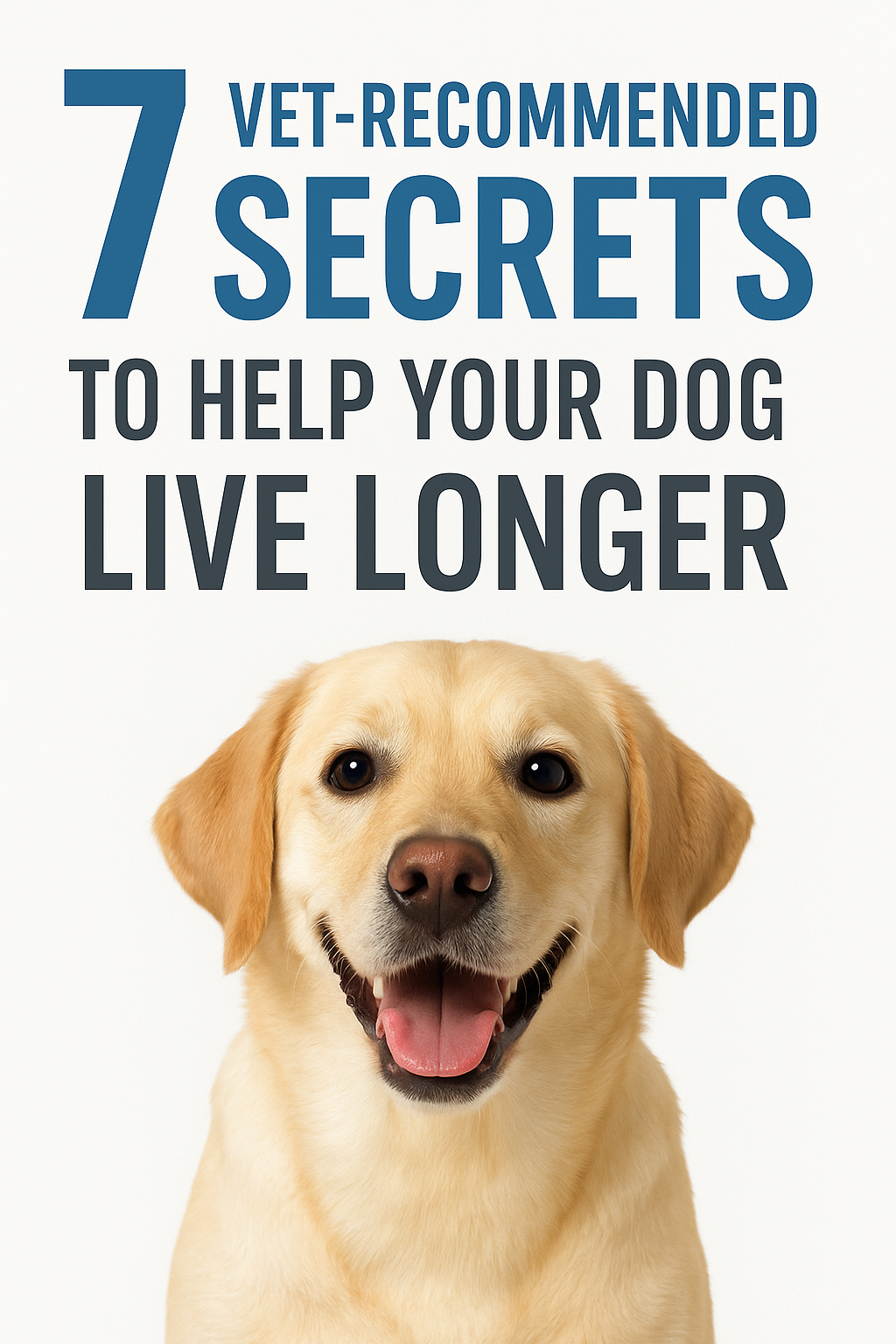
🐶 7 Vet-Recommended Secrets to Help Your Dog Live Longer – Daily Habits for a Healthy Life
7 Vet-Recommended Secrets to Help Your Dog Live Longer – Daily Habits for a Healthy Life
Why Your Dog’s Lifespan Depends on Daily Care
While genetics play a role in your dog's lifespan,
daily lifestyle habits, diet, and health management can make a difference of over five years in a dog’s life expectancy.
Small efforts and consistent routines have a big impact on your dog’s health span, not just lifespan.
By following these 7 vet-recommended longevity secrets,
you can help your dog live a longer, happier, and healthier life.
🏆 7 Vet-Recommended Secrets for a Longer Dog Life
1. Provide a Balanced and Nutritious Diet
-
Choose age-appropriate, breed-specific premium dog foods
-
Include Omega-3 fatty acids and antioxidants to boost immunity
2. Maintain an Ideal Body Weight
-
Obesity increases the risk of heart disease, diabetes, and arthritis
-
Regular weight checks and portion control are essential
3. Ensure Daily Regular Exercise
-
20–60 minutes of walks, playtime, and low-impact activities daily
-
Benefits both physical and mental health
4. Regular Health Checkups and Vaccinations
-
Schedule vet exams every 6–12 months
-
Stay current with core vaccines and deworming programs
5. Focus on Dental and Oral Care
-
Daily brushing or dental chews
-
Prevents oral infections that can lead to heart and kidney diseases
6. Minimize Stress
-
Maintain a stable and calm living environment
-
Provide consistent affection and social interaction
-
Gradually adapt your dog to new experiences
7. Tailor Care for Senior Dogs
-
Switch to senior dog food around 7 years of age
-
Consider supplements for joints, heart, and kidney support
-
Enroll in specialized senior wellness programs
💡 Additional Tips from Veterinarians
-
Monitor Water Intake: Proper hydration is crucial for kidney health
-
Prevent Parasites: Regular flea, tick, and heartworm prevention
-
Strengthen Emotional Bonds: Emotional well-being lowers stress hormones, contributing to a longer life
🛒 Recommended Products for Dog Longevity Management
-
Customized nutritional supplements (antioxidants, joint, heart support)
-
Senior-specific high-protein, low-fat dog foods
-
Daily dental care kits
👉 Explore our Dog Longevity Health Care Collection
External Resource (DoFollow)
For further reading, visit AKC – Tips for Helping Your Dog Live Longer.
Internal Resource
👉 Related article: Dog Vaccination Schedule – Complete Health Care Checklist
🧩 Frequently Asked Questions (FAQ)
Q1. What are the most dangerous diseases that affect a dog’s lifespan?
A1. Chronic illnesses like heart disease, kidney failure, and cancer are major threats.
Early detection and consistent management are key to extending life expectancy.
Q2. How can I reduce my dog's stress levels?
A2. Maintain a calm, familiar environment, provide consistent routines, and strengthen emotional connections through affection and play.
Q3. When should I start giving health supplements to my dog?
A3. Supplements can be introduced around 5–7 years of age,
especially for joint, heart, and kidney support — always consult your veterinarian first.
🥗 Longevity-Boosting Foods for Dogs and Feeding Precautions
✅ Recommended Foods That Support a Longer Life
What your dog eats every day has a direct impact on their long-term health and lifespan.
Below are some of the most vet-approved foods known to promote vitality and slow aging:
-
Lean animal proteins (e.g., chicken, turkey, salmon)
Help maintain muscle mass and support immune health -
Sweet potatoes and pumpkin
Excellent sources of fiber, beta-carotene, and vitamins A & C — great for digestion and cell health -
Blueberries and cranberries
Packed with antioxidants to reduce inflammation and oxidative stress -
Broccoli and spinach (lightly steamed)
Nutrient-rich greens that support detoxification and heart health -
Oily fish (sardines, mackerel, or fish oil)
High in Omega-3 fatty acids, which reduce joint inflammation and support cognitive function -
Probiotic-rich foods (like plain, unsweetened yogurt or vet-formulated probiotics)
Boost gut health, which is tightly connected to immune strength and longevity
⚠️ Feeding Tips and Precautions
-
Avoid processed or high-fat foods
They increase the risk of obesity and inflammation-related diseases -
Watch for food sensitivities
Introduce new foods gradually and monitor for digestive issues or allergies -
Stick to portion control
Even healthy foods can contribute to weight gain if overfed -
Don’t over-supplement
Supplements should support—not replace—a balanced diet. Consult your vet before adding anything new. -
Avoid toxic human foods
Such as chocolate, onions, grapes, macadamia nuts, and alcohol — even in small amounts
🐾 Bonus Tip: Rotate for Variety
Providing variety (while staying within approved foods) helps ensure balanced nutrition and reduces food boredom, especially in senior dogs.

